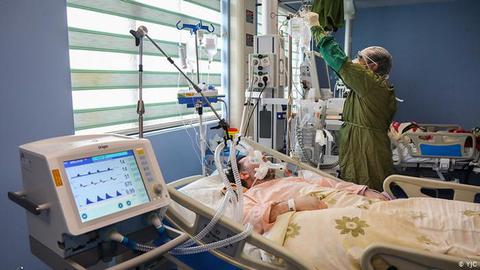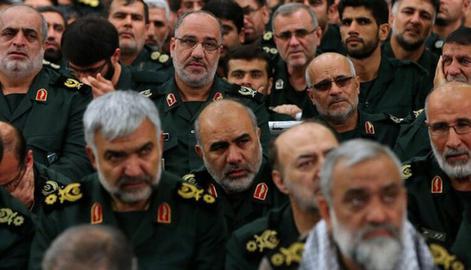It has been reported that between six to eight people die daily of COVID-19 in Gilan, making it one of the worst-hit provinces in Iran by the deadly disease.
Iran currently has the third-highest number of confirmed cases of coronavirus after China, and the situation in Gilan province has reached breaking point.
After several days of government denial over the death toll in Gilan province, finally, on Sunday, March 8, Mohammad Hossein Ghorbani, the Health Minister's representative in Gilan, attended crisis talks held by Rasht city council. In this meeting, it was estimated that at least 200 people have died from the contagious disease so far.
Hours later, Fars News Agency interviewed Ghorbani, who said of the figures, "The death toll from 'respiratory diseases' has risen to 200 in the last 16 days, but I did not say that all of these deaths were due to coronavirus disease."
Over the last few weeks, the Iranian government has been subject to accusations of downplaying the severity of the epidemic and not acknowledging the true scope of the crisis, as many fear the number of infections far surpasses the official count.
Statistics released by officials have not been trusted by the public in Iran, but according to the daily figures released by the Ministry of Health spokesperson, Kianoush Jahanpour, 496 people were infected with COVID-19 in Gilan.
The people of Gilan province now rely on videos and photos posted online and statistics released by provincial nurses and doctors for the accurate number of casualties.
With over 200 people said to have lost their lives to the virus, the rising death toll is indicative of the lack of supplies, support, and staff at hospitals around the city. The situation has now become untenable in the province.
Following a state of emergency in Gilan, members of the committee for Gilan's Representatives in the Majles penned a letter to the Majles Speaker and the Minister of Health, calling for further efforts of the National Committee to fight coronavirus in the province.
The letter cited a shortage of medical supplies in the province with doctors and nurses abandoning their position due to the lack of lifesaving equipment. It reads: "Some doctors and nurses have left work; some cities do not even have medical staff."
A shortage of vital medical equipment such as gowns, N-95 masks, hats, latex gloves, disinfectants, shields, and eyeglasses has been reported not only in the provincial capital, Rasht, but across all cities in Gilan.
In frustration, medical staff have resigned or staged walkouts, refusing to treat their patients until the necessary medical protective wear is provided.
Some nurses and physicians have expressed their objections via social media: nurses at the Amini Hospital in Langrood posted a message to their Instagram pages depicting the critical condition in which the city has found itself.
In the short but expressive message, they warn that “if we, the nurses, are not provided with the necessary tools, we will also be infected with the coronavirus. If we continue to serve without proper protective equipment, there will certainly be no one left for nursing the patients at Amini Hospital in Langrood and all nurses will become infected."
In response to the outrage expressed by the public and emergency health workers who face a shortage of protective equipment, the Health Minister's representative in Gilan, Mohammad Hossein Ghorbani, released another statement Monday, March 9, stating, "Each nurse is given protective clothing for a single shift and when he/she enters the next shift, they must use new protective clothing."
A nurse at a hospital in Rasht said of Ghorbani’s statement: "Apparently, he doesn't know that the nurses rest in the middle of a shift. We call it our sleep time," she tells IranWire.
"Anyone who has worked in the medical profession knows that their clothes and masks should be replaced after their rest time, but I use the same equipment repetitively- and I work in a private hospital in Rasht. Imagine what the situation is like in Razi Hospital, which is a government center?”
A nurse at Pirouz Lahijan Hospital confirms that, on average, between six and eight people die at the hospital on a daily basis."Unfortunately, the equipment is not available at all. Here in Lahijan and Langrood, the public sends us masks; we rarely get enough equipment.
Due to the lack of protective wear in hospitals in the province, civilians are spontaneously purchasing hospital equipment for nurses and doctors, using their own money.
"Every day, people die in front of my eyes", the nurse said, "In one case, on March 2, we registered 16 deaths here."
Among members of the public, medical staff are also becoming infected with COVID-19. Among the casualties are Dr. Mohammad Mohammadi, a pioneer physician, Dr. Hamid Lotfi, an orthopedic specialist and Dr. Reza Kochakinia, a general practitioner, all from Rasht. Dr. Siamak Dioushli, a pediatrician from Anzali and Vahid Monsef, emergency medicine specialist in Rasht, are also among the victims.
Dr. Omid Rahnama, an anesthetist, is currently hospitalised in Rasht Ghaem Hospital, battling the deadly disease. The doctor has been incubated for more than one week and expressed concern in a note addressed to Dr. Alireza Karimzadeh Haq, chief of Qaem Hospital: "I always thought I would die from an accident or cardiac arrest. I never thought I would get a viral illness. I have been living in isolation for a week and haven't seen my baby."
“Last Wednesday morning, I was asking for a mask in the ICU for hours. Why were the operating room staff not granted sick leave, forcing us to work with a fever?”.
According to information obtained by IranWire, many Gilan hospital chiefs initially did not provide their staff with protective facilities to deal with coronavirus and even refused to quarantine areas of the hospital, a major contributing factor to the soaring number of patients infected with COVID-19 in Gilan.
According to nurses at Milad Hospital, talking to IranWire, they said that due to the lack of a COVID-19 diagnosis kit, in dealing with a person whose illness was confirmed by a physician, "the hospital chief refused to provide the equipment to the nurse, saying, "the case has not been tested positive."
A Razi hospital nurse in Rasht told IranWire on Sunday, March 8, "If you ask me what the hospital situation is, I have to answer that this is not the Razi Hospital now. It should be called the Razi morgue and was formerly the Razi slaughterhouse. What do they expect four beds in the yard to accomplish? Wherever there was space, they provided beds but these patients are dying- beds do not solve their problem."
"Four beds in the yard" is in reference to the construction of a field hospital inside Razi Hospital in Rasht by the IRGC (Islamic Revolutionary Guard Corps). According to a video posted to social media, the hospital's garden is home to the construction of a field hospital containing 100 beds. It is said that the army and the IRGC have set up another field hospital in the Lacan-Shahr area of Rasht.
There is no information on the standards of these two hospitals, but the construction of them is demonstrative of the fact that the hospitals in Gilan no longer have the capacity to accommodate new patients.
The coronavirus crisis comes amid the public’s preparation for Nowruz (Iranian New Year) and markets were ordered to close with people being quarantined inside their homes, unable to leave unless it is essential.
visit the accountability section
In this section of Iran Wire, you can contact the officials and launch your campaign for various problems


























comments